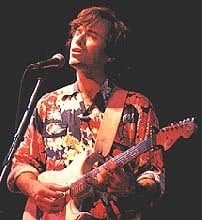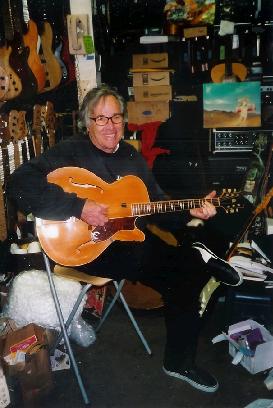Ry Cooder
Contents |
Introduction.
Ryland "Ry" Peter Cooder (born 15 March 1947, in Los Angeles, California) is a U.S. guitarist, singer and composer.
He is known for his slide guitar work, his interest in the American roots music, and, more recently, for his collaborations with traditional musicians from many countries. He was ranked number 8 on Rolling Stone's "The 100 Greatest Guitarists of All Time."
Career
During the 1960s, Cooder briefly attended Reed College in Portland, Oregon. Cooder first attracted attention in the 1960s, playing with Captain Beefheart and the Magic Band, after previously having worked with Taj Mahal in the Rising Sons. He also played with Randy Newman at this time, including on 12 Songs and possibly Newman's first album, Randy Newman. Van Dyke Parks worked with Newman and then with Cooder during the 60s. Parks arranged Cooder's "One Meatball" according to Parks' 1984 interview by Bob Claster.
Cooder was a guest session guitarist on various recording sessions with the Rolling Stones in 1968 and 1969, and his contributions appear on the Stones' Let It Bleed (mandolin on "Love in Vain"), and Sticky Fingers, on which he contributed the slide guitar on "Sister Morphine". During this period Cooder joined with Mick Jagger, Charlie Watts, Bill Wyman, and longtime Rolling Stones sideman Nicky Hopkins to record "Jamming with Edward". Shortly after the sessions, Cooder accused Keith Richards of musical plagiarism, but has since refused to comment on his accusations. Cooder also played slide guitar for the 1970 movie Performance, which contained Mick Jagger's first solo single, "Memo from Turner". The 1975 Rolling Stones compilation album Metamorphosis features an uncredited Cooder on Bill Wyman's "Downtown Suzie", which is also the first Rolling Stones song played and recorded in the open G tuning. Ry Cooder is credited on Van Morrison's critically acclaimed 1979 album, Into the Music for slide guitar on the song, "Full Force Gale".
Throughout the 1970s, Cooder released a series of Warner Bros. Records albums that showcased his guitar work. Cooder, like a musicologist or treasure hunter, explored bygone musical genres and found great old-time recordings which he then, as a musician, personalized with sensitive, updated reworkings. Thus, on his breakthrough album, Into the Purple Valley, he chose unusual instrumentations and performed his own arrangements of old Black blues and gospel songs, a Calypso, white country music songs (giving a tempo change to the cowboy ballad, "Billy the Kid"), and — to open the album — a protest song, "How Can You Keep on Moving (Unless You Migrate Too)" by Agnes "Sis" Cunningham about the Okies who were not welcomed with open arms when they migrated to escape the Dust Bowl in the 1930s — to which he gave a rousing-yet-satirical march accompaniment. Cooder's later '70s albums (with the exception of Jazz) do not fall under a single genre description, but — to generalize broadly — it might be fair to call Cooder's self titled first album blues; Into the Purple Valley, Boomer's Story, and Paradise and Lunch, folk and blues; Chicken Skin Music and Showtime, a unique melange of Tex-Mex and Hawaiian; Jazz, 1920s jazz; Bop Till You Drop, '50's R&B; and Borderline and Get Rhythm, eclectic rock-based excursions. Cooder's 1979 album Bop Till You Drop was the first popular music album to be recorded digitally. It yielded his biggest hit, an R&B cover version of Elvis Presley's 1960s recording "Little Sister".
Cooder has worked as a studio musician and has also scored many film soundtracks including Wim Wenders film Paris, Texas (1984). Cooder based this soundtrack and title song "Paris, Texas" on Blind Willie Johnson's "Dark Was the Night (Cold Was the Ground)", which he described as "The most soulful, transcendent piece in all American music." "Dark Was the Night, Cold Was the Ground" was also the basis for Cooder's song "Powis Square" for the movie Performance. His other film work includes Walter Hill's The Long Riders (1980), Southern Comfort (1981), Brewster's Millions (1985), Last Man Standing (1996), Hill's Trespass (1992) and Mike Nichols' Primary Colors (1998). Cooder dubbed all slide guitar parts in the 1986 film Crossroads, a take on the infamous tale of the blues legend, Robert Johnson. It also has a cameo performance from Steve Vai. In 1988, Cooder produced an album by Bobby King and Terry Evans on Rounder Records titled Live and Let Live. He contributed his stellar slide guitar work to every track. He also plays extensively on their 1990 self produced Rounder release Rhythm, Blues, Soul & Grooves.
In recent years, Cooder has played a role in the increased appreciation of traditional Cuban music, due to his collaboration as producer in the Buena Vista Social Club (1997) recording, which was a worldwide hit. Wim Wenders directed a documentary film of the musicians involved, Buena Vista Social Club (1999) which was nominated for an Academy Award in 2000. Cooder worked with Tuvan throat singers for the score to the 1993 film Geronimo: An American Legend.
Cooder's solo work has been an eclectic mix, taking in dust bowl folk, blues, Tex-Mex, soul, gospel, rock, and almost everything else. He has collaborated with many important musicians, including The Rolling Stones, Earl Hines, Little Feat, Captain Beefheart, The Chieftains, John Lee Hooker, Pops Staples and Mavis Staples, Gabby Pahinui, Flaco Jimenez and Ali Farka Touré. He formed the Little Village supergroup with Nick Lowe, John Hiatt, and Jim Keltner.
In 1995 he performed in The Wizard of Oz in Concert: Dreams Come True, a musical performance of the popular story at Lincoln Center to benefit the Children's Defense Fund. The performance was originally broadcast on Turner Network Television (TNT), and issued on CD and video in 1996.
His 2005 album Chávez Ravine was touted by his record label as being "a post-World War II-era American narrative of 'cool cats', radios, UFO sightings, J. Edgar Hoover, red scares, and baseball" — the record is a tribute to the long-gone Los Angeles Latino enclave known as Chávez Ravine. Using real and imagined historical characters, Cooder and friends created an album that recollects various aspects of the poor but vibrant hillside Chicano community, which was bulldozed by developers in the 1950s in the interest of “progress;” Dodger Stadium ultimately was built on the site. Cooder says, “Here is some music for a place you don’t know, up a road you don’t go. Chávez Ravine, where the sidewalk ends.” Drawing from the various musical strains of Los Angeles, including conjunto, corrido, R&B, Latin pop, and jazz, Cooder and friends conjure the ghosts of Chávez Ravine and Los Angeles at mid-century. On this fifteen-track album, sung in Spanish and English, Cooder is joined by East L.A. legends like Chicano music patriarch Lalo Guerrero, Pachuco boogie king Don Tosti, Three Midniters front man Little Willie G, and Ersi Arvizu, of The Sisters and El Chicano.
His next record was released in 2007. Entitled My Name Is Buddy, it tells the story of a cat who travels and sees the world. My Name Is Buddy was accompanied by a booklet featuring a story and illustration (by Vincent Valdez) for each track, providing additional context to Buddy's adventures.
Cooder produced and performed on an album for Mavis Staples entitled We'll Never Turn Back, which was released on April 24, 2007. The concept album focused on Gospel songs of the civil rights movement and also included two new original songs by Cooder.
Ry Cooder's I, Flathead was released on June 24, 2008. It is the completion of his California trilogy. Based on the drag racing culture of the early '60s, it is set on the desert salt flats in southern California. The disc was released as a deluxe edition as well with stories written by Mr. Cooder to accompany the music.
The song "Diaraby", which Cooder recorded with Ali Farka Touré, is used as the theme to "The World's" Geoquiz. The World is a radio show distributed by Public Radio International. The post-rock group Tortoise has a track entitled "Ry Cooder" on their 1994 self-titled album.
Cooder is also referenced in The Tragically Hip song "At the Hundredth Meridian":
"If I die of vanity, promise me, promise me that if they bury me someplace I don't want to be that you'll dig me up and transport me unceremoniously away from the swollen city breeze, garbage bag trees, whispers of disease and acts of enormity, and lower me slowly, and sadly, and properly. Get Ry Cooder to sing my eulogy"
Ry at Fatdawgs.
Awards.
1993 Grammy Award – Meeting by the River.
1995 Grammy Award – Talking Timbuktu with Ali Farka Toure.
1998 Grammy Award – Buena Vista Social Club.
2000 – Ry Cooder received an honorary doctorate from Queen's University.
2003 – Rolling Stone magazine named Ry Cooder the 8th Greatest Guitarist of All Time in their "100 Greatest Guitarists".
Discography.
Performance (1970)
Rising Sons featuring Taj Mahal and Ry Cooder (recorded 1965/66, released 1992)
Ry Cooder (December 1970)
Into the Purple Valley (February 1972)
Boomer's Story (November 1972)
Paradise and Lunch (May 1974)
Chicken Skin Music (1976)
Showtime (August 1977)
Jazz (June 1978)
Bop Till You Drop (August 1979)
The Long Riders (June 1980)
Borderline (October 1980)
The Slide Area (April 1982)
Money and Cigarettes (February 1983)
Paris, Texas (February 1985)
Music from Alamo Bay (August 1985)
Blue City (July 1986)
Crossroads (July 1986)
Why Don't You Try Me Tonight (1986)
Get Rhythm (December 1987)
Johnny Handsome (October 1989)
Little Village (1992)
Trespass (January 1993)
A Meeting By The River (1993) (with VM Bhatt)
Geronimo, An American Legend (1993)
King Cake Party (1994) (with The Zydeco Party Band)
Talking Timbuktu (1994) (with Ali Farka Touré)
Music by Ry Cooder (1995) (2 disc set of film music)
Buena Vista Social Club (September 1997)
The End of Violence (1997)
Mambo Sinuendo (January 2003) (with Manuel Galbán)
Chávez Ravine (May 2005)
My Name Is Buddy (Nonesuch Records, 2007)
I, Flathead (June 2008)
The Ry Cooder Anthology: The UFO Has Landed (October 2008)
Videos
--Sensible Jones 12:26, 21 June 2009 (CEST)







